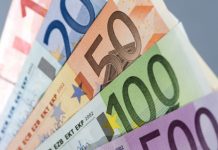The pound euro exchange rate remained relatively subdued on Thursday. The pair closed the session just a few points higher than where it started at €1.1340.
| What do these figures mean? |
|---|
|
When measuring the value of a pair of currencies, one set equals 1 unit and the other shows the current equivalent. As the market moves, the amount will vary from minute to minute. For example, it could be written: 1 GBP = 1.13990 EUR Here, £1 is equivalent to approximately €1.14. This specifically measures the pound’s worth against the euro. If the euro amount increases in this pairing, it’s positive for the pound. Or, if you were looking at it the other way around: 1 EUR = 0.87271 GBP In this example, €1 is equivalent to approximately £0.87. This measures the euro’s worth versus the British pound. If the sterling number gets larger, it’s good news for the euro. |
With no high impacting UK economic data to digest, investors remained focused on Brexit and the UK Conservative leadership contest. Brexit concerns prevented the pound from capitalising on weaker demand for the euro on Wednesday. Labour have said they will support a second referendum to prevent a no deal Brexit. Meanwhile a Eurosceptic Tory is likely to win the leadership battle to become Prime Minister. Once again potential Brexit outcomes are becoming increasingly polarised, increasing Brexit uncertainty and weighing on demand or the pound.
| Why is a “soft” Brexit better for sterling than a “hard” Brexit? |
|---|
| A soft Brexit implies anything less than UK’s complete withdrawal from the EU. For example, it could mean the UK retains some form of membership to the European Union single market in exchange for some free movement of people, i.e. immigration. This is considered more positive than a “hard” Brexit, which is a full severance from the EU. The reason “soft” is considered more pound-friendly is because the economic impact would be lower. If there is less negative impact on the economy, foreign investors will continue to invest in the UK. As investment requires local currency, this increased demand for the pound then boosts its value. |
Today, consumer sentiment will be on the radar of pound traders. Analysts are expecting a very slight tick up in consumer sentiment from -13 to -12. Another month of weak sentiment would hardly be unsurprising given the unwavering lack of clarity surrounding Brexit. This is bad news for the economy. When consumers lack confidence, they are less likely to spend, particularly on big purchases.
Eurozone Data & ECB Fears Weigh On Euro
The euro was broadly out of favour in the previous session as investors digested negative developments. Concerns of rising tensions between Rome and the European Commission over Italy’s inability to rein in its spending, continued to hit demand for the euro.
Secondly the European Central Bank’s latest financial stability report showed that ECB policymakers were growing increasingly nervous over the prospect of weaker growth amid the intensifying US — Sino trade dispute.
| Why does poor economic data drag on a country’s currency? |
|---|
| Slowing economic indicators point to a slowing economy. Weak economies have weaker currencies because institutions look to reduce investments in countries where growth prospects are low and then transfer money to countries with higher growth prospects. These institutions sell out of their investment and the local currency, thus increasing supply of the currency and pushing down the money’s worth. So, when a country or region has poor economic news, the value of the currency tends to fall. |
The euro also sunk lower as demand for the US dollar increased on Wednesday. The euro trades inversely to the US dollar. Demand for the dollar has been on the increase this week as investors look to buy into the greenback for its safe haven properties. The escalation of the US — Simo trade dispute and fears over its potential impact on the global economy are unnerving investors, sending them towards safer havens. As a result, the euro declined.
Today there is no high impacting data. Investors will continue to focus on developments in US — Sino trade dispute.
This publication is provided for general information purposes only and is not intended to cover every aspect of the topics with which it deals. It is not intended to amount to advice on which you should rely. You must obtain professional or specialist advice before taking, or refraining from, any action on the basis of the content in this publication. The information in this publication does not constitute legal, tax or other professional advice from TransferWise Inc., Currency Live or its affiliates. Prior results do not guarantee a similar outcome. We make no representations, warranties or guarantees, whether express or implied, that the content in the publication is accurate, complete or up to date. Consult our risk warning page for more details.
This article was initially published on TransferWise.com from the same author. The content at Currency Live is the sole opinion of the authors and in no way reflects the views of TransferWise Inc.





